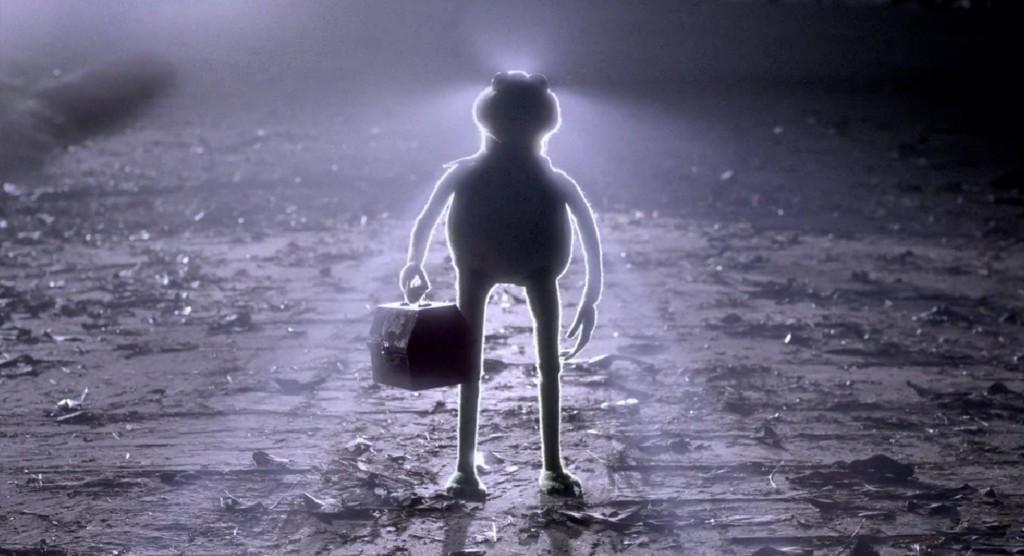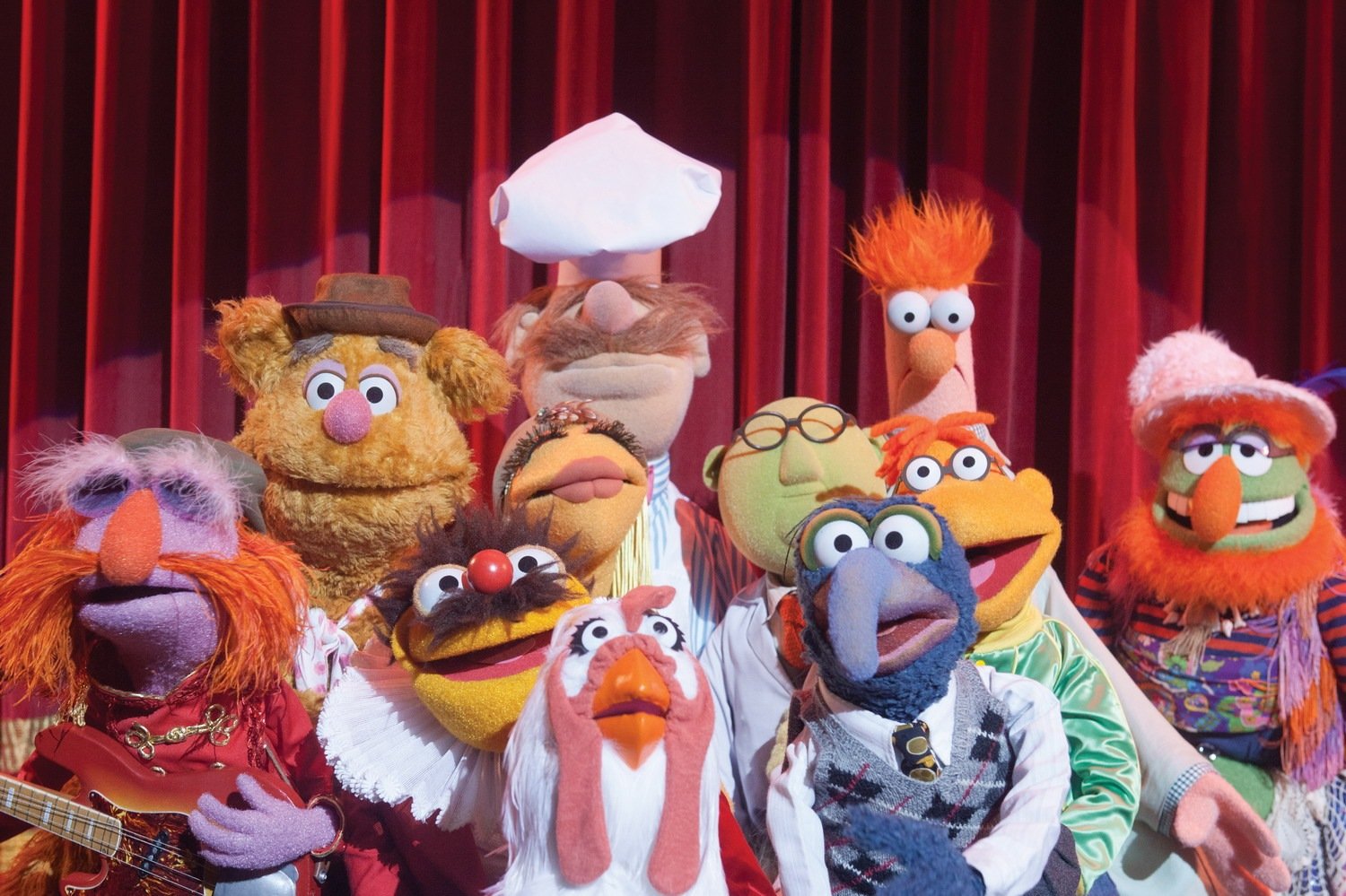
I have some issues with Jason Segal, Nick Stoller, and James Bobin’s fun, nostalgia-heavy reboot of The Muppets, which I’ll get to in a bit. But, before I put my critical hat on and not to bury the lede: For the most part, The Muppets works. It’s a sweet, good-natured, and really enjoyable Thanksgiving enterprise that hearkens back to the glories of the TV show and first three muppet films (The Muppet Movie, The Great Muppet Caper, The Muppets Take Manhattan), as well as the days when Jim Henson (we still miss you) still walked among us. And it is, in short, a really good time.
Word has come down that Frank Oz and some of the other original muppeteers were unhappy with the film, but it’s hard to imagine a more honest and heartfelt tribute coming from Hollywood these days. Say what you will about the Segal-Stoller-Bobin version of The Muppet Show, it doesn’t feel at all like a Disney cash grab. (It’s also considerably more enjoyable than the Muppet book-movies of the nineties, like A Muppet Christmas Carol and Muppet Treasure Island.) And while frankly it’s still a bit jarring to note the changes in Kermit’s inflections and facial expressions since Henson’s passing, if you just think of him as a James Bond figure, now recast as Steve Whitmire, there’s a lot to like in this production.
The movie begins with the Apatowish-feeling introduction of a new muppet, Walter (Peter Linz), and his brother Gary (Jason Segal), two all-American kids growing up in the heartland — Smalltown, to be exact. (I presume Walter was adopted.) For obvious reasons, Walter becomes obsessed with the Muppets at a very early age, and so, when planning a trip to the Big City of Los Angeles with his longtime girlfriend Mary (Amy Adams), Gary — to Mary’s mild consternation — offers to bring his brother along so he can visit the Muppet Studios. So far, so good. But on that fateful visit, Walter discovers that a nefarious oil man, Tex Richman (a hilarious, hip-hoppin’ Chris Cooper), is planning to buy the now-bedraggled studio in two weeks and destroy it, in order to get his hands on all the precious black gold pooled underneath. (In fact, he’s cut a deal with those classic one-percenters, Statler and Waldorf. Maniacal laugh, maniacal laugh.)
Naturally, Walter, Gary, and Mary track down the one-and-only Kermit the Frog — now living alone in a massive mansion bought by the since-estranged Miss Piggy — and inform him of Richman’s evil plan. To save the studio, Walter explains (having seen the contract), the Muppets will need to raise ten million dollars in the next fortnight. How can they do that? I know, let’s put on a show! And so Kermit and the team travel the world (by map) to get the band back together. As it happens, Fozzie has been working the Reno circuit with a tribute act called the Moopets (Dave Grohl, in an Animal costume, on drums.) Gonzo is a plumbing magnate, Bunsen Honeydew’s at CERN, Sam the Eagle at FOX News. But what of the porcine goddess? Can Kermit et al procure the talents of Miss Piggy once again after all these years? And, being optimistic has-beens in a harder, crueler entertainment world (the #1 show these days is Punch Teacher, hosted by Ken Jeong) where are the Muppets going to find some much-needed star wattage for their telethon? Maybe Animal made some friends in rehab…
That’s the basic gist, and for the most part The Muppets moves along with pop, fizzle, and verve — There are one-liners and sight gags piled into every corner of this film, and they usually stay true to the original wry-but-well-meaning Muppet brand of humor. Oh, yes, and there’s musical numbers too, as befitting a new Muppet movie. (They’re contributed by the Ernie of the Conchords, Bret McKenzie, and, even without FotC director Bobin providing the visuals, they’re all very Conchordian. (Consider lines like “a very manly muppet.”) Speaking of the songs, I do have a small quibble in that the humans — Jason Segal and Amy Adams — do almost all of the singing in this film. Shouldn’t the Muppets be taking point on the musical numbers most of the time?
Of course, it’d be hard for any new song to approach the timelessness of “The Rainbow Connection,” — In fact, Kermit and the gang actually sing “The Rainbow Connection” here late in the third act — which brings me to my main issue with The Muppets: It’s a total hipster nostalgia-fest, and it effectively turns the Muppet gang into Rocky Balboa or The Expendables — old, forgotten warhorses out for one more curtain call. Why not just let the Muppets continue on in another grand adventure? Do Mickey Mouse or Bugs Bunny ever worry about their contemporary cachet? Instead, Segal and Stoller have adopted an Almost Famous framing device — Walter’s desire to fit in/hang with his now out-of-date idols — that is almost suffocating at times in its Internet-era emo-hipsterishness. I mean, I grew up on and love the Muppets too, but does this film really have to be about some uber-fan’s feelings about them?
I’ll confess, it wasn’t just that I found the nostalgia cloying at times. More troublesome is the fact that the overwrought nostalgia here is tied to the wrong era. Time and again, this movie makes The Muppets seems like icons of the eighties, which I suppose is when young Segal, Stoller — and I — were into them. Here, Kermit et al sing along to (groan) Starship’s “We Built This City,” released 1985. They get a definitively eighties montage sequence, that is set up as such. Kermit has Cyndi Lauper in his rolodex (and, to be fair, President Carter.) They even have an ’80’s robot — which they continually call ’80’s Robot — driving them around from place to place, and offering people New Coke and Tab to boot.
But the problem is, The Muppets aren’t really products of the eighties at all. They’re seventies creations (and, really, Archie Bunker notwithstanding, isn’t Jim Henson one of the quintessentially seventies television icons?) Following on the beginning of Sesame Street in 1969, the Muppets appeared here and there throughout the early decade — including on Saturday Night Live — and got their own show in 1976, which ran until 1981. For that matter, The Muppet Movie came out in 1979. In 1984 — at best a year or two after what we now think of as “the eighties” coalesced — The Muppets Take Manhattan came out, effectively ending the Muppets’ participation in the decade (the exception being The Muppet Babies animated Saturday morning cartoon, whose theme song is still lodged in my head after all these years.)
The point being, The Muppets not only trafficks too much in nostalgia for my liking. It trafficks in a misplaced nostalgia that has more to do with the generation of the writers than with the actual Muppets themselves. Don’t get me wrong — Segal and Stoller do a lot right, this a very enjoyable evening at the movies, and you’ll be hard-pressed not to leave with a smile on your face. But the rewriting of history rankles — When you get right down to it, Generation Y shouldn’t misappropriate the legacy of Kermit and the gang any more than Tex Richman. Let the Muppets live their own time.


Interesting about the 80s nostalgia vs the 70s. Haven’t had a chance to see the reboot myself but I was planning on it. Maybe it’ll be a ‘catch it on DVD’ movie for me. Thanks for the review!